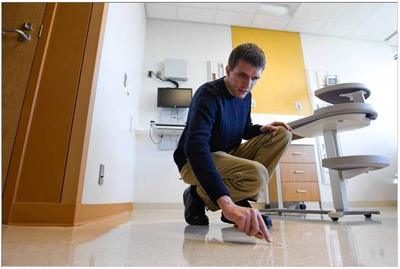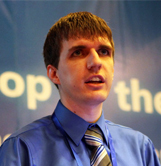
Postdoc Daniel Smith (CELS) and his research were recently featured in the Chicago Tribune. Smith is part of a large, multidisciplinary effort to catalog all of earth’s microbes.
Microbes flourish on every surface of our bodies — both inside and out. They are essential for health and often responsible for disease. Studies are beginning to find that certain combinations of bacteria can impact health conditions ranging from obesity to Crohn’s and inflammatory bowel disease.
You will remember Smith from The Home Microbiome Project. This project tracked individuals who were moving to a different location. Smith asked volunteers to collect samples every other day for six weeks to monitor how the microbiomes of themselves and their house changed in response to one another. Smith sought to find out how stable microbiomes are, and whether microbiomes colonize our homes or our home’s microbiomes colonize us.
Smith, working with Jack Gilbert and Jarrad Hampton-Marcell, has begun a new project to track hospital microbes at the University of Chicago Medical Center. This research is called the Hospital Microbiome Project which aims to collect microbial samples from surfaces, air, staff and patients from the University of Chicago’s new hospital pavilion. This large undertaking is an effort to better understand the factors that influence bacterial population development in healthcare environments.
Both Projects along with the Earth Microbiome Project seeks to understand the unseen microbial world around us.
There are quite literally billions of microbes in our environment, whether at home or at a hospital. Smith’s ongoing microbiome research is an effort to catalog and understand all these tiny creatures. Smith, along with his fellow researchers, will take more than 15,000 samples for the Hospital Microbiome Project alone. The team hopes that data collected will be able to shed light on the hidden, but numerous world of microbiomes.
 Daniel Smith graduated from Oregon State University (OSU) in 2005 with dual bachelor degrees in computer science and bioresource research, and a minor in chemistry. From 2005 to 2011 he worked with Steve Giovannoni at OSU on identifying the physiological responses of the marine bacterium Candidatus Pelagibacter ubique to different nutrient limitations. He graduated from OSU with a Ph.D. in 2011 and arrived at Argonne in 2012.
Daniel Smith graduated from Oregon State University (OSU) in 2005 with dual bachelor degrees in computer science and bioresource research, and a minor in chemistry. From 2005 to 2011 he worked with Steve Giovannoni at OSU on identifying the physiological responses of the marine bacterium Candidatus Pelagibacter ubique to different nutrient limitations. He graduated from OSU with a Ph.D. in 2011 and arrived at Argonne in 2012.

